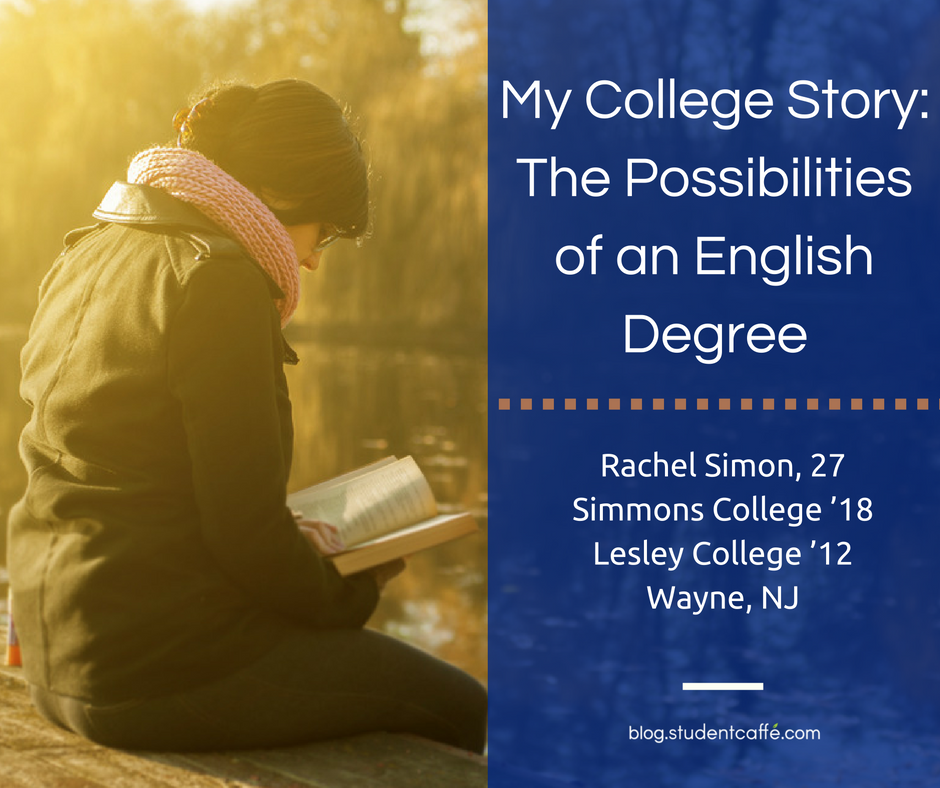
Shutterstock.com
Rachel Simon loves words. The proof? She has both a bachelor’s of arts in creative writing from Lesley College and a certificate in publishing from the University of Denver. Plus, she’s currently working toward a dual master’s in library science and children’s literature at Simmons College. After so much time poring over books, most students would burn out, but Rachel hasn’t. She’s still an avid writer, bookworm, and bibliophile.
Q. Before you arrived at Lesley College, did you know that you wanted to study creative writing and English literature at the college level?
I have always loved to read and write and grew up being told I had a very active imagination. I read many different genres, even as a kid, and was always creating “games” on the playground based on the characters I read about. I knew I was good at writing because my teachers would tell me so, and because I had older cousins, I knew you could study English. I went in, knowing I wanted to study English and creative writing because I’d get to do what I loved most: talk and write about books! I remember as I was leaving high school, my dad said to me, “I’m so impressed. You have ALWAYS known what you wanted to do and study. I never had a clue.” I think some people are “born” knowing, and [for] others, it takes time. Neither is a bad path. I have many friends who switched majors two or three times before figuring out what they wanted to pursue.
Q. How did Lesley help you become a better reader and writer?
Lesley gave me an outlet I never truly had before: a critique workshop. Growing up, I admit to writing fan fiction on the internet (yes, it still exists somewhere, though I don’t remember titles anymore!), and you could get feedback through reviews; however, most of the time it was encouraging feedback of liking my writing style and wanting more. At Lesley, I was able to get positive and negative feedback and really learn what I could work on. You had to listen to the people giving you feedback; you could not defend your work. I think that was so valuable for me. I really had to listen. I wasn’t just told, “You’re a great writer.” I was really given constructive criticism. And that is something I take with me everywhere now. I have the ability to take feedback and listen and think about it and work on it. That skill can be transferred to any job.
Q. Many college English majors don’t pursue careers in books or words, but you seem determined. What did you do immediately after graduation?
I always tell people that while I got a great degree and have a passion for literature and writing, I stepped out of college not knowing WHAT I wanted to do. That’s the truth. I had contemplated going to library school my senior year, but I wasn’t sure, so I didn’t apply. I did quite a bit of temporary office work and wrote novels on the side for fun, but I really was pretty aimless. I thrived in a school setting and had never been without one, so I felt very unsure of every “work” move I made. To be honest, my parents sat me down and said, “Okay… what do you want to do?” and that’s really where I thought about what I should pursue next.

Tata Chen / Shutterstock.com
Q. What was the Denver Publishing Institute like?
The Denver Publishing Institute, or DPI (as we call it), was one of my favorite experiences. It is a six-week summer program at the University of Denver with intense lectures on copyediting, editing, marketing, publicity, different types of publishing you could go into, what a literary agent does, etc. You earn a certificate in publishing, and since each lecture has a professional leading it, there are so many contacts to be made. I lived with three other amazing girls, who I still keep in contact with and adore. I came out [of it] realizing I LOVED books but also realizing how competitive the publishing field is.
Q. Why did you choose to pursue library science instead of continuing on with publishing?
I went to DPI and really adored the people I met as well as the contacts I made; however, I learned it wasn’t for me. Publishing is very competitive and I often joke, “I’m too nice of a person to compete with someone!” so I’d step aside. You can’t have that attitude in publishing. You really have to believe you belong in that world. After I went to DPI and came home, I sat down with myself and asked what I loved most about books. I realized that while I loved writing, I REALLY loved recommending books and receiving positive responses after the person had read the book I’d recommended. I knew I could put that toward a library degree—among other things!—and so I decided to return to school.
I applied to two graduate programs, one in New York City and one in Boston. My family is from the tristate area, and I wanted to give myself a way to go home. Ultimately, I stayed up in Boston, where I felt the program was really strong and a tiny bit of scholarship money didn’t hurt. I am pursuing a dual degree: an MA in children’s literature (theory) and MS in library and information science! It is a three-year program because of the dual master’s degrees, and I believe it is 100% worth it.
Q. What will your master’s in library science and children’s literature prepare you to do after graduation?
Because I am a dual degree, the aim is to become a youth services librarian in a public library setting. My dream job would be working for a smaller branch of a library system and getting to do teen events or working the circulation desk and getting to help people in that way. Being a reference librarian also appeals to me, too. So much of being a librarian is connecting patrons with the right material, and helping people is something that really appeals to me. Because I will have an MA in children’s literature, I also have the opportunity to pursue adjunct teaching at a college or go into publishing. I love that my dual degrees give me more of a wide scope. There is so much out there that I am learning about through the MS/MA program.
Q. What three books should every undergrad read?
Three books I think every undergraduate should read are: Fangirl by Rainbow Rowell, Station Eleven by Emily St. John Mandel, and The Spectacular Now by Tim Tharp (which was also made into a movie that was wonderful as well!). Fangirl chronicles the freshman year of social anxiety-ridden Cath, who spends most of her time writing fan fiction in her dorm room or going to class. I think it’s the perfect book to give to an incoming freshman. Station Eleven is an adult novel about an apocalypse, but it weaves back and forth between when it began and 25 years later and focuses on various characters, including a Shakespeare troupe. The novel connects all of the characters as you read on, and I love the allusions to the Shakespeare play King Lear throughout. It might even be fun to read with Shakespeare! And finally… The Spectacular Now is a young adult novel about a boy named Sutter, who says he’s really happy in his senior year of high school, but as a reader, you learn that’s not quite the case. I think it’s a wonderful example of “voice” and unreliable narrator as well as a look into how we always perceive ourselves—and others—a certain way that may not be true.

Mladen Mitrinovic / Shutterstock.com
Q. What advice would you give to an English major who wants to use their talents after graduation but isn’t sure which career path to pursue?
I would say look for freelance writing/editing positions online or around town; get any kind of work under your belt, whether it’s temping in an office or being a tutor; and [know] that our paths tend to figure themselves out even if they seem windy and confusing. Don’t be afraid to test out different options as well: network with others in the field you’re curious about, have coffee/meet-up dates with them to talk about what it’s like, and apply for many different jobs. You never know where you will end up.
-
My College Story: Becoming a Brooklyn Designer and Company Owner
-
My College Story: Working Full-Time and Attending Graduate School
-
My College Story: Student, Employee and Business Owner
-
My College Story: Starting the IHateTextbooks Website
-
My College Story: Graduating Early and Following My Passions
-
My College Story: Figuring It out Along the Way
-
My College Story: Making the Most of Community College
-
My College Story: From Apprenticeship to Aircraft Maintenance
-
My College Story: Student and CEO
-
My College Story: Entering the Field of Psychology
-
My College Story: The Importance of Studying Abroad
-
My College Story: The Intersection of Graphic Design and Advertising

